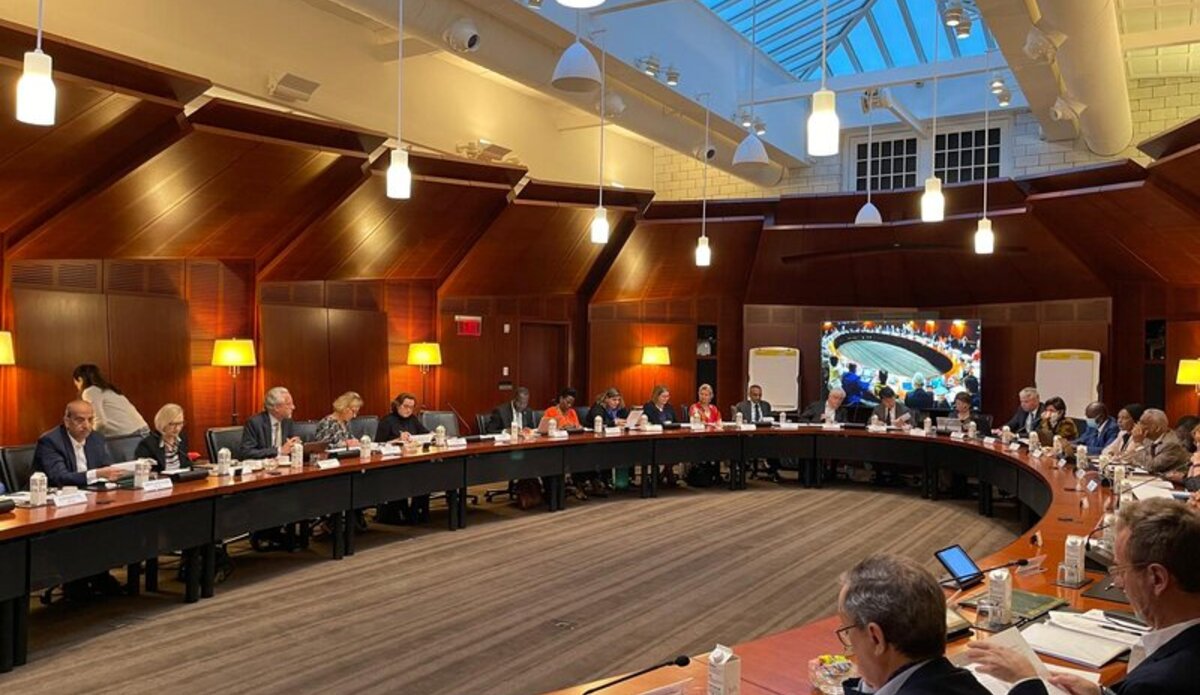Excellencies,
It is a pleasure to join you today.
As the Secretary-General underscored in his briefing to the Peacebuilding Commission in March, peace is the most important task we have at the United Nations. And this is a task that is becoming greater and more complicated.
Today, we are facing a series of overlapping threats that have far-reaching implications for the global collective security architecture, and that affect the ability of the UN to carry out its work.
These threats are manifest at various levels and in different realms.
At the geopolitical level, conflicts have become more fragmented, regionalized and thus harder to resolve. They increasingly test the effectiveness of many of our traditional conflict management and resolution tools.
Climate change is exacerbating risks and creating additional sources of stress – particularly in the most fragile settings.
This is not a future challenge, but a present one. We are seeing, for example, the increasing frequency and intensity of violent conflicts between farmers and herders across many countries in Central and West Africa, which have significant consequences for stability.
Technological disruption is shaping conflict across the world. Conflict is increasingly hybrid, fought in the battlefield as well as online through cyber operations that create potential for miscalculation, and which often target infrastructure that is critical for civilians.
Increasing use of sophisticated new weapons challenge existing legal frameworks – and may create risks of unprecedented escalation.
Disinformation and hate speech are widespread, crossing from online realms to offline action, engendering polarization and violence.
A perceived failure of governance – of the ability of States to deliver essential services that respond to the aspirations of their people – is giving rise to tensions and social unrest in many regions.
Exclusion and inequalities of all kinds — economic, social and cultural — exact a devastating toll on security.
The COVID-19 pandemic has exacerbated many of these risks, while at the same time putting significant pressure on the ability of States to deliver. The pandemic also showed the real limitations of global preparedness and solidarity – all of which are essential to our work in prevention.
These phenomena, on their own but particularly in combination, have dire consequences for the most vulnerable communities.
Women and girls, especially, have already been disproportionately affected by the deteriorating security and socio-economic environment – including with the unprecedented spike in domestic and gender-based violence during the pandemic.
The confluence of these factors also makes our work to prevent and resolve conflicts much more difficult, particularly at a time when there is growing skepticism about multilateralism. And just when there is more need for collective solutions.
This is why the Secretary-General has emphasized the importance of conflict prevention and peacebuilding in “Our Common Agenda”. We must get better at addressing these challenges before conflicts breakout.
Recent events only confirm the urgency of our collective task.
The war in Ukraine is having a global impact – what the Secretary-General refers to as a triple crisis, as food security, energy and finance are affected by the ongoing conflict.
In these times, the contributions the Peacebuilding Commission makes to advance our efforts to avert conflict and build lasting peace are invaluable. Even more important will be considering how the Commission can be even more effective, a question I know is of utmost importance for you, too.
A decade ago, I sat where you are as a member of the PBC. The Commission was still deciding its agenda and profile.
Since that time, the PBC has grown into a most valuable body for fostering consensus and action on key areas that are essential for sustaining peace.
The ambitious programme of work for 2022 you adopted in March highlights several priorities that, when implemented, will further reinforce the Commission’s central role.
We strongly support the Commission’s decision to expand its geographic and thematic scope as well as the continued emphasis on inclusive approaches in support of national peacebuilding initiatives. We cannot achieve lasting impact without engaging and empowering women and youth.
Helping countries build more inclusive societies, based on trust, social cohesion, and human rights, requires a coherent approach.
And the Commission’s convening role has been instrumental in bringing the UN system together.
Further the Commission’s efforts to build stronger partnerships with regional and sub-regional organizations, civil society organizations and the private sector have been vital.
I remember the first time the PBC briefed the Security Council. And I can tell you that not all Council members were enthusiastic about letting you into the club.
Since that time the Commission’s advisory role has expanded considerably and your contribution to Council deliberations has become essential.
Excellencies
Let me conclude by noting that at last week’s General Assembly High-level meeting on peacebuilding financing, we heard, loud and clear, that Member States are convinced of the need to invest more in peacebuilding and prevention work.
Member States agree that it is cost-effective but underfunded. We heard appreciation for the work of this Commission and testimonies regarding the critical role of the Peacebuilding Fund as a flexible and agile tool to support national peacebuilding priorities.
More needs to be done to secure increased resources for the Peacebuilding Fund, including through assessed contributions.
I really want to thank the Commission for its valuable input to the General Assembly in advance of the High-level meeting and for continuing to prioritize financing as a key requirement for effective peacebuilding initiatives.
I hope that this retreat has provided you with the space and opportunity to build on the excellent 2022 programme of work.
We are all invested in helping realize the full potential of the PBC as an indispensable tool of the UN peace and security architecture.
I congratulate you for what you have accomplished and look forward to your continued support and to backing your good work to build peace.
Thank you.

